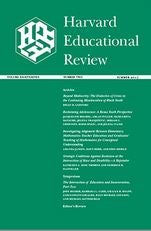The Summer 2017 issue of the Harvard Educational Review (HER) includes “Reclaiming Adolescence: A Roma Youth Perspective,” a paper about the FXB Roma Program research in Serbia in partnership with the Center for Interactive Pedagogy. Jacqueline Bhabha, Arlan Fuller, Margarete Matache, Jelena Vranjesevic, Miriam Chernoff, Boris Spasic, and Jelena Ivanis coauthored it. Most of the abstract and a few sentences from the opening paragraph appear below:
In this article, the authors present data gathered in the Reclaiming Adolescence research project, which investigated the educational hardships of Roma youth by comparing their experiences with their non-Roma peers’ in Belgrade, Serbia. Serious inequalities in access to secondary and tertiary education affect the life and career opportunities of Romani adolescents in Europe. Yet, despite a plethora of reports and surveys on this topic, the views of young Roma themselves remain undocumented. This article reports on research that addresses this lacuna in terms of both substantive findings and methodological innovation…
Jelena, a young Roma, planned to look for a job in a beauty salon once she
finished her part-time vocational school. This was a revision of her more ambitious
earlier career aspirations, a change of direction caused by her poor
school achievement record. Years of exposure to an unwelcoming school and
social environment in Belgrade had affected her ability to succeed academically.
Go to the link for the paper.
To further highlight the team’s work, Margareta Matache, Jacqueline Bhabha, and Arlan Fuller contributed an op-ed to Voices in Education, the HER blog. The opening paragraph of “Writing Romani Youth Lives” follows:

